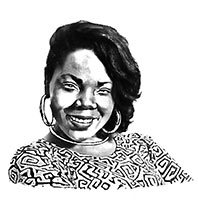Getting sleep is not easy. For one thing, 89 percent of American adults have a glowing gadget in their bedroom, keeping us engaged and bathed in light. Despite our bad habits—our belief that sometimes we must cheat our bodies of sleep to make any progress in working life—we also know that a proper night’s rest can do wonders. Researchers are more precisely closing in on why: A study last fall in the journal Science found that sleep drives “metabolite clearance” in our brains, removing the neurotoxic junk that accumulates during the day. Finally, an answer for why we didn’t evolve out of this inconvenient habit. Sleep, in effect, takes out the trash.
Tossing and Turning
Five New York problem sleepers detail how they slept—or didn’t—during a single night. Then Alcibiades J. Rodriguez, M.D., medical director of the New York Sleep Institute, guides them toward better rest.

Case 1:
The On-Call Doc
Alex Sankin, 32, urologic-oncology fellow; Upper East Side
Problem:
An erratic sleep schedule that he has little control over.
Midnight Bedtime. “I’m trying to fall asleep, but it isn’t easy because I have a pager in my underwear and jammed up into my hip bone. When it buzzes, my entire body vibrates.”
1 a.m. Paranoia wins. “There’s no way to sleep comfortably atop a pager, but it’s almost pointless anyway: I still wake up regularly to check it, just in case.”
2:15 a.m. Pager goes off. “At my former residency in Brooklyn, pages at this hour frequently meant someone accidentally shot himself in the testicle. It happens more often than you’d think. Tonight’s call is more routine, but I have to go into the hospital anyway.”
4 a.m. Find a bed. “My work is done, but I’m still on call and it’s not worth going home. So I head to one of the call rooms, with twin-bed-size rooms for doctors to sleep in at times like this. It’s not the most pleasant of places, but even a small amount of sleep helps.”
From the Expert: Conventional wisdom holds that you shouldn’t nap for less than 90 minutes. The reasoning: It takes 90 minutes for your brain to complete a full sleep cycle—from light sleep to REM and back—and waking up in the middle of it will deprive you of real rest. Rodriguez says that’s bunk, especially for someone in an un-predictable situation like this. “If you’re hungry and you eat a little bit, you feel good, even if you’re not totally satisfied,” he says. Sankin is doing the right thing by getting whatever sleep he can.

Case 2:
The Senior Sleeper
Arline, 90, retired; Upper West Side
Problem:
Has had trouble sleeping through the night for ten years.
10:30 p.m. Bedtime. “I’ve been to a sleep clinic twice, but nobody’s able to help me. And I’ve been told that Ambien isn’t recommended for people my age, so I don’t take it. Instead, I start each night the same—naturally falling asleep.”
1 a.m. Up as usual. “Going to the bathroom is, unfortunately, for older people, a big reason for being disturbed at night. So I’m up. To fall back asleep, I take a lesser-strength Sonata.”
3 a.m. Still up. “I can usually fall asleep after that first Sonata, but sometimes it just doesn’t work. Tonight is one of those nights. So I take the second one. That does it.”
6:30 a.m. Start the day. “I don’t always wake up feeling refreshed. Sometimes I’ll take a nap later in the day, but I set the kitchen timer for 30 minutes. My doctor told me that if I nap any longer than that, I’ll have more trouble at night.”
From the Expert: According to Rodriguez, as we age, our sleep gets lighter. Any little thing can wake us up. Arline has been screened for other sleep disorders, which is good: It’s important to make sure there isn’t an underlying issue. But since she’s clear, Rodriguez says there’s not a lot to do for her. She should, however, make one crucial change to her routine: Unlike the younger on-call doc, Arline “shouldn’t take naps during the day,” he says. At all.

Case 3:
The Night Owl
Jeffrey Paul Bobrick, “30ish,” Cutco-knife distributor; Upper East Side
Problem:
So energized at night that he stays up working—sometimes until dawn.
Midnight Business time. “When I was 9, I discovered that if I stayed awake until my parents fell asleep, I could do whatever I wanted. The habit stuck. Now I feel fresh and alert when most people are going to bed, and because I make my own hours, I save a lot of my work until late. For the next three hours, I email customers and prepare spreadsheets.”
3 a.m. Call PST. “Because of my odd hours, I’ve made a lot of friends on the West Coast. I hop on the phone with one.”
6:45 a.m. Remember sleep. “The phone call ends, and I decide it’s time to rest. I literally have to tell myself: ‘It’s 6:45—are you tired now? Even if you don’t feel tired, you are tired!’ Sometimes I meditate, just to calm down. But the truth is, my body really is tired. I’ve just ignored it. So I fall asleep quickly.”
From the Expert: It’s true that, biologically, some people function better at night—and Bobrick loves being one of them. But if he went to a sleep doctor, he’d be given this diagnosis: delayed sleep phase, a circadian-rhythm disorder. The only solution is a new, very rigid schedule, perhaps at first requiring medication to knock him out. And Rodriguez says there’s reason to consider it: Even though many people who sleep irregular hours claim that they’re fully functioning during the day, “when you test reaction time and awareness, they’re lesser-functioning.”

Case 4:
The Overnight Worker
Nekia Seymore, 32, producer at Sirius XM; South Bronx
Problem:
Typically starts work at 8:30 p.m., and often doesn’t get back home until 7 a.m.
10 a.m. Fighting fatigue. “I’m home and sleepy, but I’m up texting with friends and watching the news. It’s hard for me to go to sleep when it’s a nice day.”
1 p.m. Stifle the lights. “It’s impossible to make it dark in here, so I do what I can: I put on an eye mask, cover my head with a blanket, put in earplugs, and face away from the window. I need total silence to fall asleep, but that’s almost impossible during the day. I try to ignore my upstairs neighbors’ footsteps. Perhaps 30 minutes later, I doze off.”
7 p.m. Wake up. “I rarely sleep straight through the day; I usually wake up at 3 or 4 p.m., check my phone, and then am sucked into the day. But today was lucky: I rested. Still, I’m groggy. I’ve been doing this for two years now, and it still feels unnatural.”
From the Expert: Statistics are on her side: 70 percent of overnight workers can fully alter their sleep cycle, Rodriguez says. The key is to train the body using the same guides—light and hormones—that the rest of us use. At the beginning of her day, about 16 to 18 hours before Seymore is ready to sleep, she should expose herself to bright light—ideally 10,000 lux, far brighter than the average bulb, which mimics waking up to sunshine and sets her body on a schedule. Then when she leaves work, she should wear sunglasses so as to not disrupt her body’s melatonin production. “Isolate yourself from the light as much as possible,” Rodriguez says.

Case 5:
The Nightlife Survivor
Talia Aroshas, 25, blog editor; Greenwich Village
Problem:
Lives above a music venue, and her bedroom window faces the street.
11:30 p.m. In bed. “It’s always loud in my room. I’ve lived here for seven years, though, and have gotten used to the sound of cars and people’s chitchat on the street. So I settle in, and fall asleep by midnight.”
1 a.m. Jolted awake. “This happens every night. I wasn’t a light sleeper before moving here, but now I’m never asleep for long. I spend the next hour on my computer, just trying to feel sleepy again.”
2 a.m. The drunks are out. “It’s impossible to block out—people yelling, fighting. Some jerk with a guitar always starts a drunken sing-along. I put in my heavy-duty earplugs.”
4 a.m. Give up. “I’m awoken again; the drunks are unbearable tonight. If it were a little later, I’d stay in bed: There’s one beautiful hour of quiet here, from 5 to 6 a.m., and I treasure it. But I need sleep now, so I move to my tiny Ikea couch in my living room. It’s uncomfortable, but far quieter; there’s no window to the street. I finally, finally rest … until 6 a.m., when I’m up for work.”
From the Expert: She should move—now. “Sleep is a habit,” Rodriguez says, “and we can develop a bad sleeping habit.” This lifestyle is almost certainly going to do that, making it harder for Aroshas to sleep even when she finally escapes to a quieter block. It’s vital to create an environment in which the bed is for sleep, not for struggling. “Some people don’t sleep enough at night, and they stay in bed longer,” he says. “But the more you stay in bed not sleeping, the more common it becomes for you to not sleep in bed.”